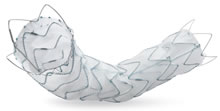|
June 7, 2008 -- Medtronic, Inc. (NYSE: MDT) has announced their latest FDA approval for an endovascular device: the Talent™ Thoracic Stent Graft.
An aortic aneurysm occurs at a weakened segment of the aorta, the body's main artery. Due the the pressure of the blood flow, the weakened vessel wall begins expanding and ultimately over time may rupture, often a fatal event. For decades, repair of an aortic aneurysm required a significant "open" surgical procedure, due to the location of the aorta which is underneath many other anatomic structures and organs. The aorta would be isolated, the aneurysmal sack often excised, and an artificial graft sewn into place. One of the problems with this procedure was that many patients suffering from aortic aneurysms are elderly, often with co-morbidities that made such an invasive open surgical procedure risky, if not impossible.
Although there was much resistance to this new technique in the beginning, over the past decade this technology has advanced to the point where endovascular treatment of aortic aneurysms is now considered equivalent of the "gold standard" of surgery for many patient populations, and the only treatment for those patients who cannot tolerate surgery. Medtronic was one of the early manufacturers of this technology. Information from their press release, announcing the FDA approval, follows. Thoracic aneurysms affect 10 out of every 100,000 elderly Americans, and data suggest that the rate of this condition is increasing steadily. While an estimated 60,000 Americans have a thoracic aortic aneurysm, only about half are ever diagnosed due to lack of symptoms. The rupture of an undiagnosed aneurysm or weakness of the thoracic aorta is frequently fatal. More common among smokers, the condition often results from hardening of the arteries, hypertension or congenital disorders such as Marfan’s syndrome. "There are still many patients undiagnosed and in need of treatment for thoracic aortic disease,” said Dr. Ronald Fairman, professor of Surgery and chief of Vascular Surgery at the University of Pennsylvania Hospital. “FDA approval of the Talent Thoracic Stent Graft is an important development in physicians’ abilities to treat this life-threatening condition. In my own experience, this device offers a superior alternative to open surgery and will allow physicians to perform minimally-invasive thoracic aortic aneurysm repair for a broader population of patients.” The Talent Thoracic Stent Graft System makes thoracic endovascular aortic repair (TEVAR) accessible to an additional 25 percent of patients, because of its unique features. It is available in the widest range of diameters – from 22 mm to 46 mm. This size matrix offers physicians multiple options to customize devices for their patients’ needs and to treat a wider range of anatomies than with the other available endografts. Clinically Proven Safety and EfficacyThe Medtronic-sponsored Investigational Device Exemption (IDE) study of the Talent Thoracic Stent Graft System is called the VALOR clinical trial and enrolled 195 subjects at 38 medical centers between December 2003 and June 2005. All 195 patients received a Talent Thoracic Stent Graft, and their outcomes were compared to 189 open surgical control patients at three centers of excellence who matched selected inclusion/exclusion criteria of the VALOR trial. Dr. Fairman served as VALOR’s principal investigator. The Talent Thoracic Stent Graft System Test Group met its primary safety and efficacy endpoints, with an all-cause mortality of 16.1 percent and a successful aneurysm treatment rate of 89.2 percent at 12 months. In the VALOR trial, 30-day mortality was 2.1 percent and aneurysm-related mortality at 12 months was 3.1 percent. The VALOR data show that endovascular therapy with the Talent Thoracic Stent Graft results in lower mortality than open surgery, as well as low rates of morbidity and device-related adverse events. Leading Product Portfolio Broadens In mid-April, Medtronic received FDA approval for the Talent Abdominal Stent Graft for endovascular aortic repair (EVAR) of abdominal aortic aneurysms. Both the Talent Abdominal and Thoracic devices represent new options for many U.S. patients with aortic disease that would otherwise require open surgery. They further broaden the leading portfolio of endovascular stent grafts in the medical technology industry. "Each year there are at least 15,000 preventable deaths in the Unites States due to aortic weakness and rupture,” said Tony Semedo, vice president and general manager of the Endovascular Innovations business at Medtronic. “Medtronic began laying the foundation of minimally-invasive treatment in the mid-1990s and remains committed to leadership in this field, which seeks to improve outcomes for patients with aortic aneurysms and related conditions. We have the broadest stent graft portfolio, and are working diligently to ensure that patients who would benefit from a minimally-invasive treatment have access to these life-saving devices.” As a pioneer of endovascular therapy, Medtronic has been an innovator and leader in the aortic stent graft industry for more than a decade. Its long history includes more than 130,000 patients treated with stent grafts dating back to 1995. Medtronic currently offers the broadest portfolio of aortic stent grafts in the industry. These include the Talent Abdominal and Thoracic Stent Graft Systems worldwide, the AneuRx AAAdvantage® Abdominal Stent Graft System in the United States, and the Valiant® Thoracic Stent Graft System outside the United States. About Medtronic Medtronic, Inc. (www.medtronic.com), headquartered in Minneapolis, is the global leader in medical technology – alleviating pain, restoring health, and extending life for millions of people around the world. Any forward-looking statements are subject to risks and uncertainties such as those described in Medtronic’s Annual Report on Form 10-K for the year ended April 27, 2007. Actual results may differ materially from anticipated results. Source: Medtronic, Inc. with additional reporting by Burt Cohen of Angioplasty.Org |

